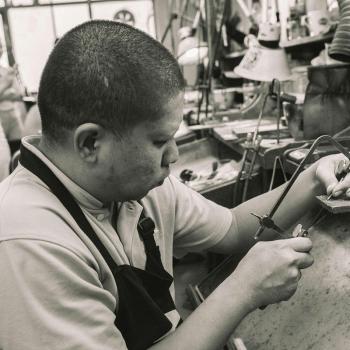August is Overdose Awareness Month, and August 31 is Overdose Awareness Day. How can your church end the stigma and save lives?
Image by Лечение Наркомании from Pixabay
I am uniquely qualified to write this article. Having pastored multiple churches over twenty-six years, I can appreciate the church’s aversion to addiction. Many devout Christians see addiction as sin. Now, in my second career as a behavioral health specialist, I work primarily with individuals experiencing homelessness. Many of these precious souls have a dual diagnosis of serious mental illness (SMI) and substance use disorder (SUD). Rather than viewing addiction as a sin, I now understand it as a disease. Your faith community can raise awareness by ending the stigma of addiction. And, by practicing harm reduction techniques, your faith community can save lives.
What Would Jesus Do?
In my last article, “Substance Use Harm Reduction: What Would Jesus Do?” I addressed why Jesus would promote harm reduction practices and products. However many Christians disagree, claiming that when we provide a safer means toward a risky behavior, we are essentially condoning the behavior. But, like Jesus, we should care more about the people than we care about defilement.
If the Church Practiced Harm Reduction
So, what would it look like if the church practiced harm reduction? Here are seven things you won’t hear in an evangelical church but should.
- The Johnsons are offering a six-week Sunday school on LGBTQIA+ inclusion and affirmation, starting next week.
- Free condoms and lube samples are available in the narthex.
- The STI testing clinic will be on Tuesday at 7 pm, in the parish hall.
- For anybody who needs a ride across the state line for gender-affirming care or abortion services, please speak with the deacon chair.
- Please, use whichever restroom fits your gender identity.
- In case of overdose, call 911 and notify the parish nurse, who is equipped with Narcan.
- Fentanyl test strips, clean needles, and silicone mouthpieces for glass pipes are available next to the bathrooms.
If the Church practiced harm reduction techniques and distributed harm reduction products, it would be acting like Jesus. What’s more, the Church would save lives. Harm reduction applies not just to substance use, but also to sexual health and mental health. Here are some additional ideas about how your church can save lives.
Mental Health Harm Reduction
Too often, Evangelical pastors have waved Bibles from their pulpits and declared, “This book has the answer to every question you can possibly have!” This is patently false and does great harm to those in need of mental healthcare.
The church must do what it can to promote modern ideas concerning mental health, psychiatry, and psychology. You can’t pray everything away. Promoting and even paying for mental healthcare for parishioners is one form of harm reduction that your church can do today. Here are some other ideas about how your church can practice mental health harm reduction:
- Promoting healthy self-esteem rather than teaching about original sin and human depravity
- Educating about mental health treatment (not demons)
- Educating about suicide prevention
When we take mental health seriously and stop treating mental illness as a spiritual or character defect, we can act like Jesus, and save lives.
Sexual Harm Reduction
Purity culture has gone a long way toward harming the development of healthy sexuality in young adults. Imposing a dichotomy of absolute righteousness on the one hand and inexcusable sin on the other, the Church sets its adolescents up for failure. This failure results in shame. Shame produces low self-esteem and also encourages dishonesty about relationships and sexuality.
Secrecy about sexuality creates a culture in which neither the Church nor parents are willing to teach sexual health to young people. It’s something that students learn about on their own, from porn, or from friends. And often after it’s too late. Due to a lack of teaching (and perhaps a lack of access or reluctance to use birth control), unplanned pregnancies occur at a higher rate among Evangelicals than the general population. A church engaged in sexual harm reduction might consider the following:
- Prevention:
- Education on affirming LGBTQIA+ individuals
- Classes on sexual ethics that aren’t based on abstinence-only
- Providing both male and female condoms, lube, and other sexual wellness products
- Response:
- Transporting people to get STI testing
- Supporting people who choose legal abortions, as well as promoting adoption options
Substance Use Harm Reduction
When it comes to behaviors it considers sin, the Church has one approach: “Just say no! Just don’t do that. And if you’re doing that, then just stop doing that.” The righteousness-versus-sin dichotomy doesn’t understand the compulsive nature of addiction. Neither does it grasp the moral gray areas involved.
Most people using illicit drugs are self-medicating trauma, and not setting out to sin at all. When the church labels substances as sin, it stigmatizes users. This is much the same as it stigmatizes those who engage in sexuality outside of marriage. The result is a similar spiral of shame, dishonesty, secrecy, and unhealth. The church needs to stop stigmatizing people who struggle, and instead practice harm reduction. Here are some ideas for substance use harm reduction that your church might employ:
- Prevention
- Changing laws criminalizing simple possession of small amounts of drugs and paraphernalia
- Offering overdose prevention (supervised use) sites
- Offering a syringe services program, or promoting that of your local health department
- Education regarding substance use issues.
- Response
- Offering free Narcan
- Offering community nursing centered around substance use and wound care
Overdose Awareness Day: How Can Your Church Save Lives?
August 31 is Overdose Awareness Day. Hopefully, this article will help you to think differently about stigmatizing substance use by using the language of sin rather than sickness. Working together to end the stigma, we can foster an environment where people can discuss their problems rather than cover them up.
In this article, I have listed things you probably won’t hear in evangelical churches but should. I’m sure you could add to the list. Churches that offer harm reduction products, services, approaches, and referrals can improve the physical, sexual, and mental health of their parishioners. Those churches that fixate on righteousness-versus-sin often withhold important resources from their members. By focusing too much on eternal life, they risk the physical lives of believers. But churches that practice harm reduction help to keep their members around long enough to make an eternal difference.















